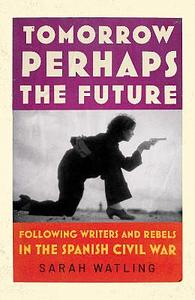Take a photo of a barcode or cover
8 reviews for:
Tomorrow Perhaps the Future: A Book about Writers, Outsiders, and the Spanish Civil War
Sarah Watling
8 reviews for:
Tomorrow Perhaps the Future: A Book about Writers, Outsiders, and the Spanish Civil War
Sarah Watling
challenging
informative
inspiring
medium-paced
Amazing to hear about the women who did what they can to report back about what was going on in Spain. It was chilling to hear some things at the start of the book and seeing similarities to what is happening in parts of the world in 2025.
These women were inspirational and we'll do it again. Women are always there.
These women were inspirational and we'll do it again. Women are always there.
challenging
informative
reflective
medium-paced
The Spanish Civil War from 1936-1939 inspired many people from Britain and other countries to become involved in the fight against fascism and to defend alternative possibilities (communism, socialism, anarchism or democracy). Tomorrow Perhaps the Future tells the stories of a number of women, mostly writers, mostly British or American, some well known, some forgotten, who went to Spain to fight, to help in the war effort or to report what was happening, or by campaigning for the cause in their own countries. The women featured in the book, all supporters of the Republican side in the war, include Martha Gellhorn, Josephine Herbst, Salaria Kea, Nancy Cunard, Virginia Woolf, Sylvia Townsend Warner, Valentine Ackland, Jessica Mitford, Nan Green, Simone Weil (very briefly) and Gerda Taro. Some but not all of them were Communist Party members or sympathisers.
This is not really as one reviewer suggested, a "feminist history" of the war - that would presumably be a book about the history of Spanish women in the war, and I do have at least one such book - this is a biography/history of a group of outsider women, writers and rebels from outside Spain, their involvement in the war and how it affected their lives and writing. It is written from a perspective that is clearly feminist (and sympathetic to these women's political convictions).
The book is divided into three sections, reflecting the progress of the war, Beginnings, Arrivals and Retreat, and each chapter within those sections focuses on two or three women. They spent various amounts of time actually in Spain - Jessica Mitford and Simone Weil were not able to spend long there before being forced to leave, some made more than one trip, and Salaria Kea was there as a nurse with the Abraham Lincoln Brigade. Virginia Woolf never went to Spain, and seems to have been drawn in to the cause with some reluctance, partly through her beloved nephew Julian Bell, but she spoke at a fundraiser for Basque refugees, and struggled to write about how to deal with tyranny and war in her book Three Guineas.
I found this book fascinating and thought provoking. I want to reread the whole book again, and to follow up some of the stories by reading more about their lives and their published writings. I really felt the author's disappointment and frustration when researching Salaria Kea, who never completed and published her attempts at a memoir of her experiences, and whose story Watling had to piece together from fragments in archives. The book is readable yet scholarly. Black and white photographs are reproduced within the text with a list of illustrations and credits at the end, after the extensive footnotes and before the index.
Very highly recommended to readers interested in the Spanish Civil War and the participants in the struggle whose stories are told here.
This is not really as one reviewer suggested, a "feminist history" of the war - that would presumably be a book about the history of Spanish women in the war, and I do have at least one such book - this is a biography/history of a group of outsider women, writers and rebels from outside Spain, their involvement in the war and how it affected their lives and writing. It is written from a perspective that is clearly feminist (and sympathetic to these women's political convictions).
The book is divided into three sections, reflecting the progress of the war, Beginnings, Arrivals and Retreat, and each chapter within those sections focuses on two or three women. They spent various amounts of time actually in Spain - Jessica Mitford and Simone Weil were not able to spend long there before being forced to leave, some made more than one trip, and Salaria Kea was there as a nurse with the Abraham Lincoln Brigade. Virginia Woolf never went to Spain, and seems to have been drawn in to the cause with some reluctance, partly through her beloved nephew Julian Bell, but she spoke at a fundraiser for Basque refugees, and struggled to write about how to deal with tyranny and war in her book Three Guineas.
I found this book fascinating and thought provoking. I want to reread the whole book again, and to follow up some of the stories by reading more about their lives and their published writings. I really felt the author's disappointment and frustration when researching Salaria Kea, who never completed and published her attempts at a memoir of her experiences, and whose story Watling had to piece together from fragments in archives. The book is readable yet scholarly. Black and white photographs are reproduced within the text with a list of illustrations and credits at the end, after the extensive footnotes and before the index.
Very highly recommended to readers interested in the Spanish Civil War and the participants in the struggle whose stories are told here.
challenging
hopeful
informative
reflective
sad
slow-paced
informative
inspiring
emotional
inspiring
sad
medium-paced
challenging
informative
slow-paced
informative
medium-paced
emotional
informative
inspiring
reflective
A brilliantly written account of the lives of some incredibly brave and passionate women. The author's respect and compassion for her subjects really stands out. Informative, compelling and increasingly emotional as we get towards the end.


